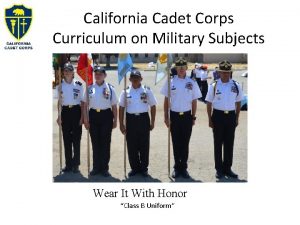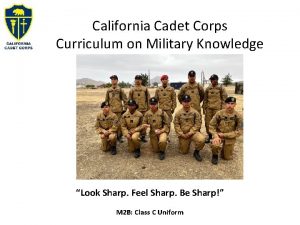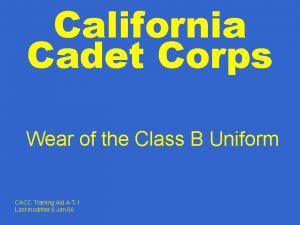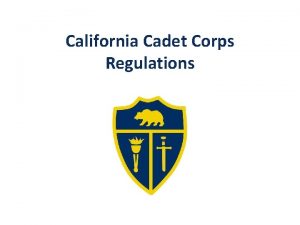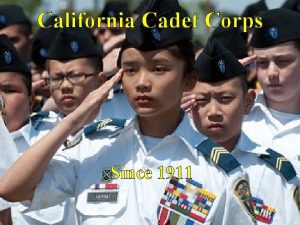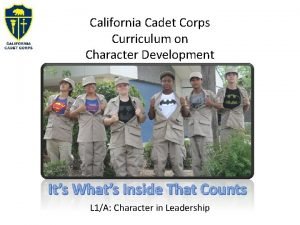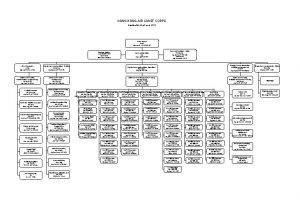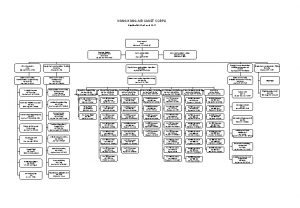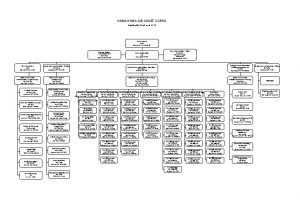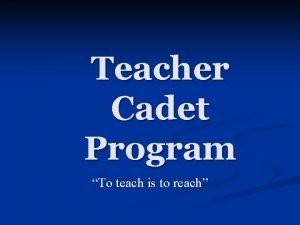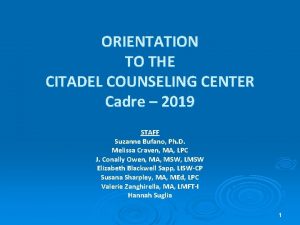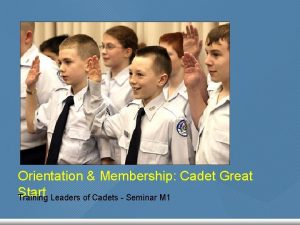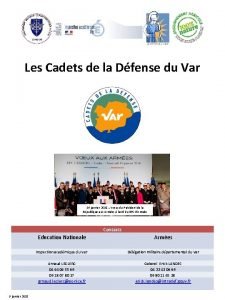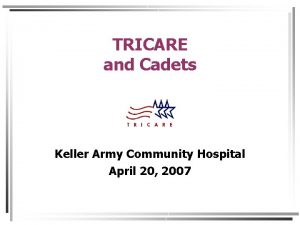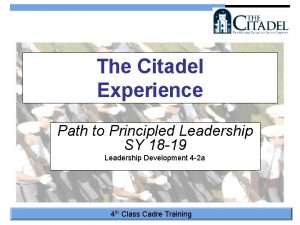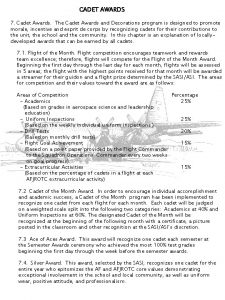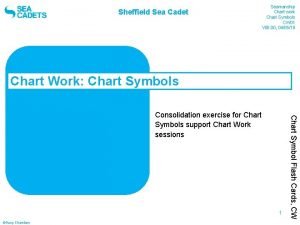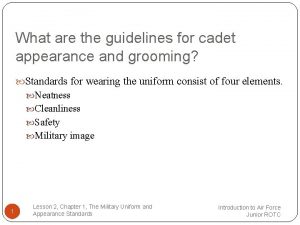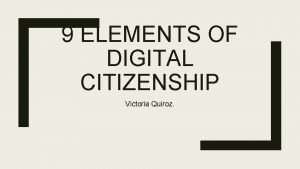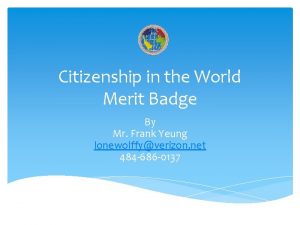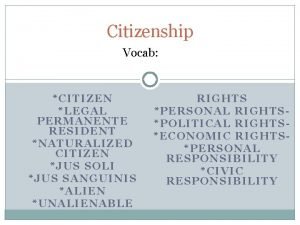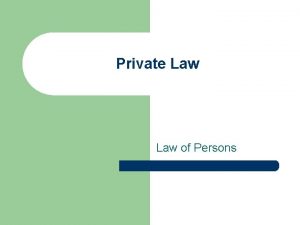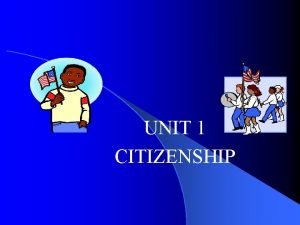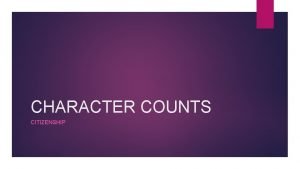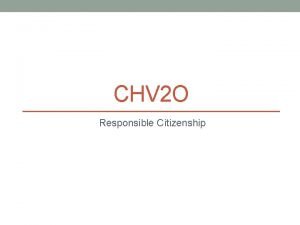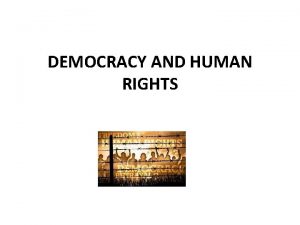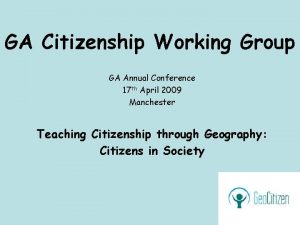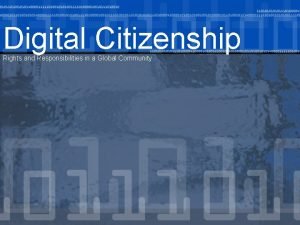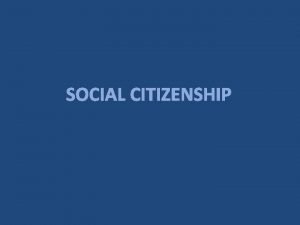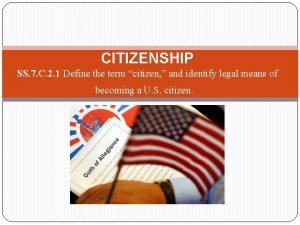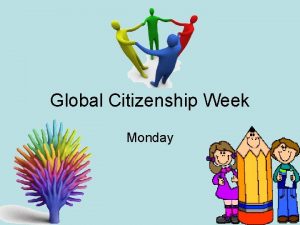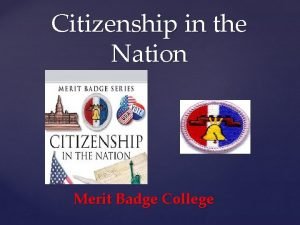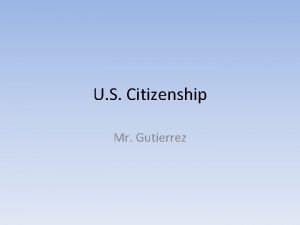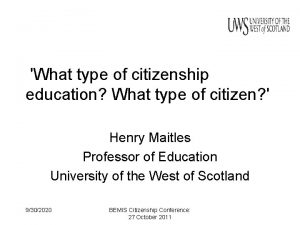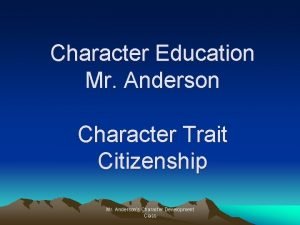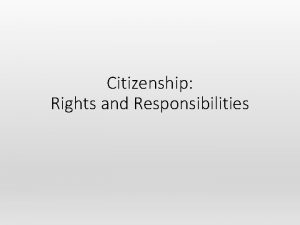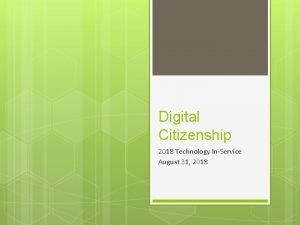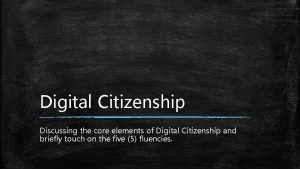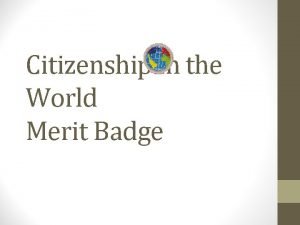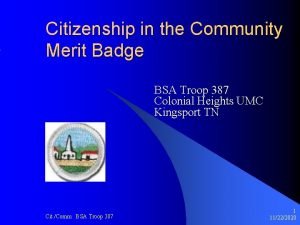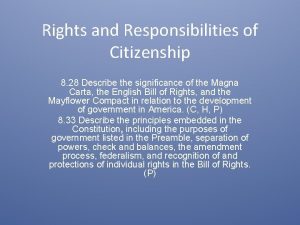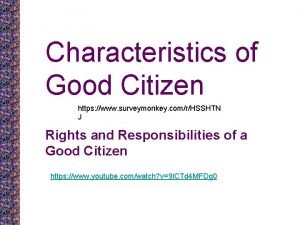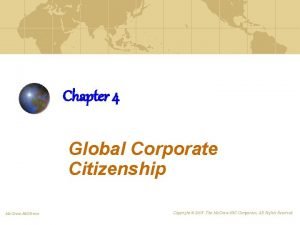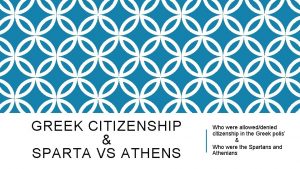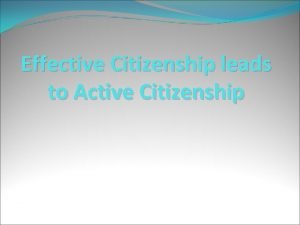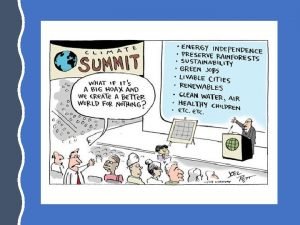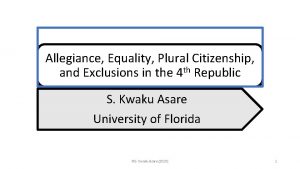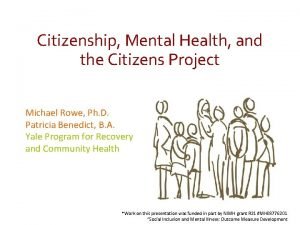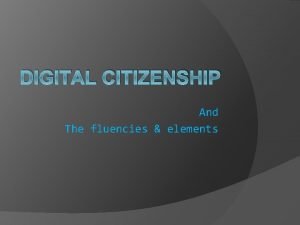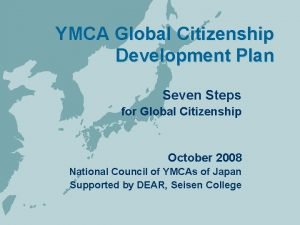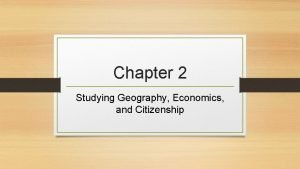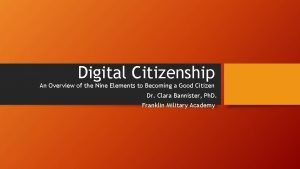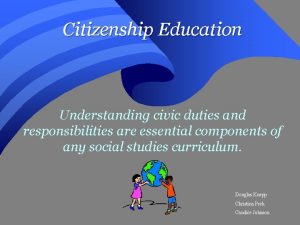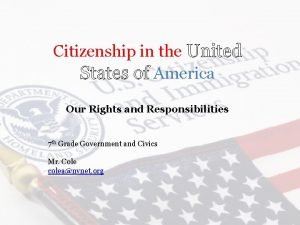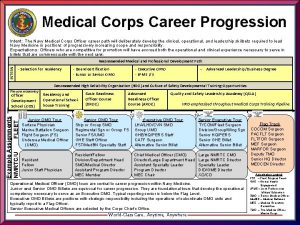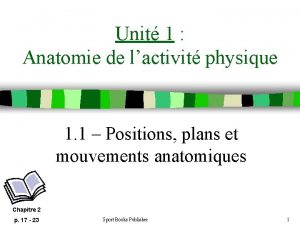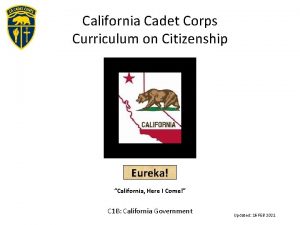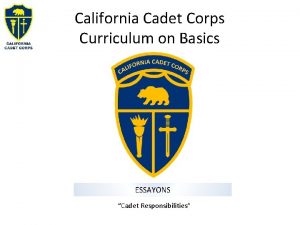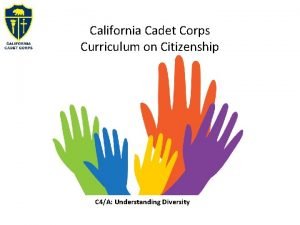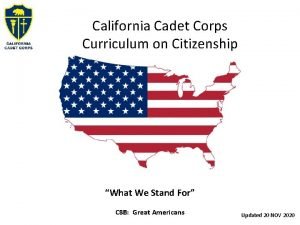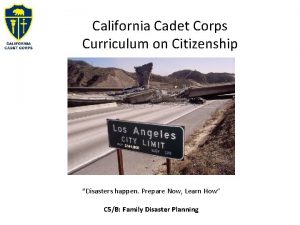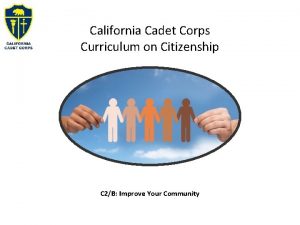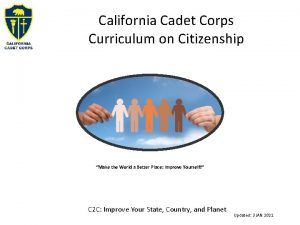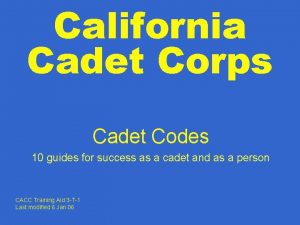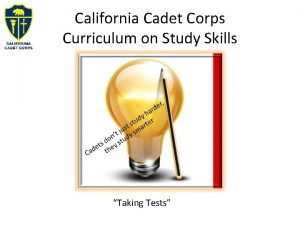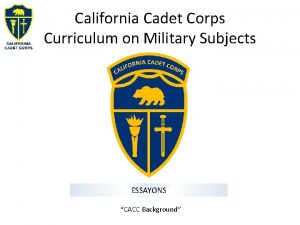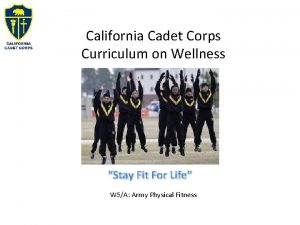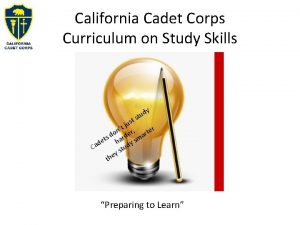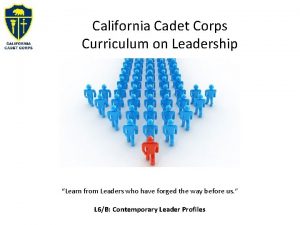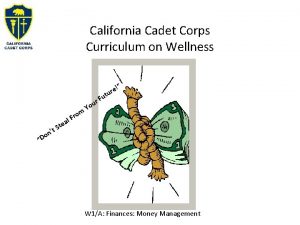California Cadet Corps Curriculum on Citizenship What We

















































































































- Slides: 113

California Cadet Corps Curriculum on Citizenship “What We Stand For” C 8 A: Common American Values Updated 26 OCT 2020

Common American Values Agenda • • • A 1. Declaration of Independence A 2. The Constitution A 3. The Bill of Rights A 4. A Democratic Republic A 5. Democratic Values A 6. Capitalism A 7. Individualism A 8. Freedom A 9. Importance of Time and Work Ethic A 10. Equality

THE DECLARATION OF INDEPENDENCE OBJECTIVES DESIRED OUTCOME (Followership) At the conclusion of this training, Cadets will have a better concept of the values that Americans as a nation hold dear, their meaning, and the sources of those values. Plan of Action: 1. Identify who wrote the Declaration of Independence, when, and why. 2. Identify the five parts of the Declaration of Independence. 3. Identify the American values established in the Declaration of Independence Essential Question: What did the Declaration of Independence do for the fledgling American nation?

Declaration of Independence • Published July 4, 1776 • Drafted by Thomas Jefferson with help from a committee of Ben Franklin, John Adams, Roger Sherman, & Robert Livingston • Proclaimed the colonies’ independence from Great Britain and King George • Edited & approved by the members of the 2 nd Continental Congress

5 Parts • • Introduction “When in the course of human events. . . ” Preamble “We hold these truths to be self-evident. . . ” Indictment grievances against the King & Parliament Denunciation of the British People what we’ve done to warn you. . . • Conclusion “We, therefore, . . . “

The Signers • 56 members of the 2 nd Continental Congress • Signed by state (colony) groups • John Hancock – President of Congress For more information: Declaration of Independence Signers

Main Ideas in the Declaration of Independence Main Ideas: ØFrom the Enlightenment – European philosophies ØEquality “all men are created equal” ØFreedom “Life, Liberty, & the pursuit of Happiness” ØOpportunity “pursuit of Happiness” ØPower of government comes from the consent of the people governed ØPeople have the right to abolish their government and institute a new one

Values in the Declaration of Independence ØEquality ØLiberty ØOpportunity

The Enlightenment a European intellectual movement of the 17 th and 18 th centuries that emphasized reason and science. The philosophy advocated for a society based upon reason rather than faith, a civil order based on natural law and science, with ideals such as liberty, progress, tolerance, fraternity, constitutional government, and separation of church and state. Radicals believed in democracy, individual liberty, freedom of expression, and eradication of religious authority. (Lumen, Accessed in OCT 2020)

Equality The value of equality as it comes from our nation’s founding documents, is the equal treatment of people irrespective of social or cultural differences. It has grown, in law, to mean equal treatment and rights regardless of race, color, gender, religion, age, sexual orientation, or national origin.

Liberty The state of being free. As a value, Liberty refers to the ability to choose our own path, believe and say and do what we want (as long as it doesn’t hurt others). The Bill of Rights – the first ten amendments to the Constitution - guarantees Americans freedom of speech, press, and religion, the right to bear arms, to refuse to have soldiers quartered in your house, freedom of unreasonable search and seizure, right to a speedy and fair trial by jury, and against self-incrimination, and freedom from excessive bail or fines. “It’s a free country” implies your ability to do something that’s not illegal or forbidden, even if others don’t like it.

Opportunity What is ‘the right to Life, Liberty, and the pursuit of Happiness’ if not opportunity to make something of yourself. This is a strongly held value in America and is a value that many immigrants have held most dear. The American Dream

Check on Learning 1. What are three values put forth in the Declaration of Independence? 2. What two points does the Declaration of Independence make about people and their government? 3. What are the 5 parts of the Declaration of Independence? 4. When was the Declaration of Independence signed? 5. Who primarily drafted the Declaration of Independence?

THE CONSTITUTION OBJECTIVES DESIRED OUTCOME (Followership) At the conclusion of this training, Cadets will have a better concept of the values that Americans as a nation hold dear, their meaning, and the sources of those values. Plan of Action: 4. 5. 6. 7. Identify the US Constitution by a description of its purpose Identify principles outlined in the US Constitution Identify the concepts put forth in the seven Articles of the Constitution Identify the main values reinforced by the US Constitution Essential Question: What is the significance of the Constitution in reinforcing American values?

US Constitution • Establishes the law of the United States • Establishes the government of the US • Ratified on Constitution Day: September 17, 1787

Principles in the Constitution Popular sovereignty, meaning rule by the people Republicanism, meaning the right to vote for representatives Federalism, meaning power is shared between the national and state governments Separation of powers into branches that make, enforce or interpret laws Balance of Power - controls (checks) can be made on the other branches Limited government - everyone is bound by the US Constitution Individual rights - personal freedoms are guaranteed by the Bill of Rights Judicial Review – the power of the courts to determine the legality of laws

Justice • The quality of being fair and reasonable • A focus of much of the Constitution • Amendments 4 -8 give protection from many of the grievances against the King’s system of justice

Parts of the Constitution • Preamble: purpose & guiding principles • 7 Articles: branches of gov’t, amending process, relations between the states, establishes law, establishing government • Closing Endorsement – 39 delegates signed • Amendments: Bill of Rights & 17 more

Seven Articles I: Describes the Legislative Branch of government II: Describes the Office of the President of the US III: Describes the court system IV: Outlines relations among the states and between each state and the federal government V: Outlines the process to amend the Constitution VI: Establishes that the Constitution and federal laws and treaties are the law of the land VII: Describes how the government is established

Values in the Constitution • • Liberty (Amendments 1 -3) Equality (14 th Amendment) Justice (Amendments 4 -8) Privacy (Amendments 4, 5, 9 & 14)

Privacy • The right to be left alone • Free from unreasonable search & seizure • Right to free assembly • Right to due process • Privacy within family, marriage, motherhood, procreation, & child rearing • Personal autonomy / right to choose • Personal information

Key Constitutional Amendments • • • Congress votes, states ratify (3/4 must ratify) First 10 are the Bill of Rights 13 th abolished slavery 14 th defined American citizenship 15 th gave all men the right to vote 16 th established income tax 18 th / 21 st Prohibition 19 th gave women the right to vote 22 nd limited presidency to two terms

Check on Learning 1. Define: a) Popular sovereignty b) Separation of powers c) Judicial review 2. How many articles are in the Constitution? 3. What are the constitutional values we named?

THE BILL OF RIGHTS OBJECTIVES DESIRED OUTCOME (Followership) At the conclusion of this training, Cadets will have a better concept of the values that Americans as a nation hold dear, their meaning, and the sources of those values. Plan of Action: 8. Identify the purpose of the Bill of Rights 9. Identify the rights spelled out in the Bill of Rights Essential Question: What rights are put forth in the Bill of Rights for all Americans?

Why the Bill of Rights • When the 2 nd Continental Congress drafted the Constitution, they argued a lot • Federalists vs Anti-Federalists • Needed vagueness and compromise to get all states to vote to ratify the Constitution • James Madison drafted 12 amendments – 1 was ratified in 1992, 1 was never ratified • Ratified and added to Constitution Dec 15, 1791

Debate • The Federalists wanted a strong federal government. They were led by James Madison and influenced by Alexander Hamilton. • The Anti-Federalists opposed a strong federal government. They wanted states to have more authority. They were concerned that the presidency might evolve into a monarchy. They were led by Patrick Henry. They wanted a bill of rights to ensure individual rights wouldn’t erode.

Ratification of the Constitution • Of the 13 states, only five ratified the Constitution with relative ease (DE, PA, NJ, GA, & CT) • The rest only came to ratification through recommending amendments • These amendments were compiled by Madison into the Bill of Rights

First Amendment 1: Freedom of Religion, Freedom of Speech, Freedom of the Press, Right to Assemble, Right to petition the Government for a redress of grievances

2 nd & 3 rd Amendments 2. Citizens’ rights to bear arms 3. Prevents the government from quartering troops in private homes

4 th & 5 th Amendments 4. No unreasonable search and seizure of the property of US citizens 5. No self-incrimination (“take the fifth”), no prosecution or punishment without due process, no double jeopardy, eminent domain

6 th & 7 th Amendments 6. Guarantees a speedy trial by a jury of one’s peers, being informed of the crime you’re accused of, and the right to confront witnesses, compel testimony, and have legal representation. 7. Provides that civil cases also be tried by jury.

8 th & 9 th Amendments 8. Prohibits excessive bail, excessive fines, and cruel and unusual punishments. 9. The list of rights in the Constitution is not exhaustive, and that the people still have all the rights that are not listed.

10 th Amendment

State Rights • The Bill of Rights applied only to the federal government • After the Civil War, with the passage of the 14 th Amendment, courts began interpreting the Constitution in favor of extending these rights to state and local governments • Most of the Bill of Rights is now enforceable against state governments • This is called incorporation

Check on Learning 1. Whose concern that rights might be eroded, and the presidency turn into a monarchy caused the Bill of Rights to be written? a) b) 2. Federalists Anti-Federalists Match a right to its Amendment: Amendments: 1 st 2 nd 3 rd 4 th 5 th 6 th 7 th 8 th 9 th 10 th a) b) c) d) e) f) Free Speech No Self-incrimination Bear Arms Freedom of Religion Speedy trial Powers not specified to the US gov’t go to the states

A DEMOCRATIC REPUBLIC OBJECTIVES DESIRED OUTCOME (Followership) At the conclusion of this training, Cadets will have a better concept of the values that Americans as a nation hold dear, their meaning, and the sources of those values. Plan of Action: 10. Differentiate a Republic from a Democracy 11. Identify key attributes of government put forth in the Declaration of Independence and Constitution Essential Question: How does representation work in a republic, and what are other attributes of our governmental systems?

Forms of Government

How they Work

Democracy vs Republic

Meaning has Changed • In today’s terminology, a republic is considered a democracy • They are both forms of government in which supreme power resides in the citizens • Democracy can refer to representational government, or it can refer to what is also called a direct democracy, in which the citizens themselves participate in the act of governing directly

Why? • Why did the founding father make the US a republic? • It worked better • They were solving the problems they’d suffered under

Attributes of US System Republic vs Monarchy (popular sovereignty) All citizens are equal before the law Political parties provide legitimate opposition Federalism, meaning power is shared between the national and state governments Separation of powers into branches that make, enforce or interpret laws Balance of Power - controls (checks) can be made on the other branches Individual rights - personal freedoms are guaranteed by the Bill of Rights Judicial Review – the power of the courts to determine the legality of laws Separation of Church and State No taxation without representation Opportunity to pursue happiness Government controlled by Law (the Constitution)

Check on Learning 1. Is the United States a republic or a democracy? 2. What’s the difference? 3. Which of these is part of our system? 1. Political parties provide legitimate opposition 2. Power concentrated in one branch 3. Laws made by Congress are absolute law 4. No taxation without representation 5. Government controlled by Law

DEMOCRATIC VALUES OBJECTIVES DESIRED OUTCOME (Followership) At the conclusion of this training, Cadets will have a better concept of the values that Americans as a nation hold dear, their meaning, and the sources of those values. Plan of Action: 12. Explain the core democratic values found in the Declaration of Independence, Constitution, and other core American foundational documents 13. Identify key American cultural values Essential Question: What are the core American values as expressed in our founding governmental documents?

Values are important because they guide our beliefs, attitudes and behavior; consequently, they are a key foundation of democracy.

Core Democratic Values • • • Life Liberty Pursuit of Happiness Justice Common Good Equality Truth Diversity Popular Sovereignty Patriotism

Life Each citizen has the right to the protection of his or her life

Liberty Includes the freedom to believe what you want, freedom to choose your own friends, and to have your own ideas and opinions, to express your ideas in public, the right for people to meet in groups, the right to have any lawful job or business

Pursuit of Happiness Each citizen can find happiness in his or her own way, so long as he or she does not step on the rights of others

Justice All people should be treated fairly in getting advantages and disadvantages of our country. No group or person should be favored.

Common Good Citizens should work together for the good of all. The government should make laws that are good for everyone.

Equality Everyone should get the same treatment regardless of where their parents or grandparents were born, their race, their religion or how much money they have. Citizens all have political, social, and economic equality.

Truth The government and citizens should not lie.

Diversity Differences in language, dress, food, where parents or grandparents were born, race and religion are not only allowed but accepted as important.

Popular Sovereignty

Patriotism This means having a devotion to our country and the core democratic values in what we say and what we do.

Cultural Values Common popular ideologies or standards of behavior that persist in American culture. – – – – Personal control over the environment Change/mobility Time and its importance Equality/egalitarianism Individualism and privacy Self-help Competition and free enterprise Future orientation Action and work orientation Informality Directness, Openness and honesty Practicality/efficiency Materialism/Acquisitions Kohls, L. Robert; The Values Americans Live By; https: //careercenter. lehigh. edu/sites/careercenter. lehigh. edu/files/American. Values. pdf

Personal Control Over the Environment • Antithesis of Fate • Man’s power over Nature • Human achievement • Challenge of what can be done, when most of the world is certain it can’t

Change / Mobility • Development, improvement, progress, growth • Antithesis of tradition, continuity, a rich and ancient heritage • Moving forward toward achieving more

Time & its Importance • Keeping to a schedule • More important than developing deep personal relationships (especially in business or politics) • Being late is considered rude • Leads to productivity

Equality / Egalitarianism • • Almost a religious value (created equal) Equal opportunity for success in life Rank & Status not as important Antithesis of class and authority

Individualism and Privacy • Everyone is completely and marvelously unique • Group’s welfare less important • People pop in and out of groups • Everyone is ‘special’ in some way • Privacy – ownership of your ‘self’

Self Help • Credit for what you accomplish yourself • Self-made man or woman is the ideal in America • What you accomplish yourself is worth more

Competition & Free Enterprise • Competition brings out the best in any individual • Antithesis of cooperation • Free enterprise – a competitive economy • A society which fosters competition progresses more rapidly

Future Orientation • Look to the future • Devalue the past, unconscious of the present • Work now for future rewards

Action & Work Orientation • Don’t just stand there – do something! • Action is superior to inaction • Leisure is less important than work • Workaholics • Identify with your profession – that’s who you are • Physical labor is a positive thing

Informality • Informal and casual is widespread • Uncomfortable with titles • Informal dress in formal situations

Directness / Openness / Honesty • • • Direct approach is preferred Honest negative evaluations Antithesis of saving face Hinting and subtlety discouraged Deliver the negative message yourself, don’t use intermediaries

Practicality and Efficiency Realistic, practical, efficient Not philosophically or theoretically oriented Philosophy of pragmatism Rational and objective over emotional or subjective • Avoid sentimental decisions • Trial and error • •

Materialism / Acquisitions • The American Dream – ‘stuff’ • May be generational, not as obvious as 50 years ago • Protection of property is important • Throw-away society • Trading up – car, house, etc.

Check on Learning In your own words, define: 1. Liberty 2. Justice 3. Diversity 4. Time and its importance 5. Competition and free enterprise 6. Directness, openness, and honesty

CAPITALISM OBJECTIVES DESIRED OUTCOME (Followership) At the conclusion of this training, Cadets will have a better concept of the values that Americans as a nation hold dear, their meaning, and the sources of those values. Plan of Action: 14. Define capitalism and identify its main characteristics Essential Question: What is capitalism, and how does it contribute to the American governmental system?

Capitalism refers to an economic system in which a society’s means of production are held by private individuals or organizations, not the government, and where products, prices, and the distribution of goods are determined mainly by competition in a free market.

The Good and the Bad • At its best, capitalism is a system where people can be successful (i. e. make money) by working hard, being a good competitor, delivering products wanted by consumers • At its worst, capitalism is a system where greedy wealthy capitalists (the owner class) take advantage of a poor working class, making money at the expense of others. • Both aspects happen – not all good or bad

Characteristics of Capitalism • • • Private Ownership Capital Accumulation Capital Concentration (1%) Voluntary Participation Free Markets Wage Labor Competition Innovation Minimal government involvement

Capitalism Pro & Con PRO CON • Strong incentives to be productive, efficient, and to improve things • Tends to result in economic growth and improvement in standard of living • Can result in a high concentration of wealth in the hands of a relatively small group of people • Produces undesirable outputs (i. e. pollution) with little incentive to prevent them • Government policy can mitigate these issues with regulation, taxation, and spending programs designed to improve quality of life and reduce bad outcomes

Case Study • • • Germany Especially in banking and education Prosperous industries – trained labor force Specialization in certain markets Local entrepreneurs develop new industries

Case Study • USA • Environment encourages risk taking and expansion of small businesses into larger • Encourages hard work – equal opportunity • National values support competition, hard work, reach for wealth • Rights and patents enforced • Allowances for some monopolies

Case Study • • • China Focused on educating the masses – work force Encourages exports Pro-business and pro-market Jobs help country prosper, quality of life Encourages entrepreneurship within political and social boundaries

Case Study • India • Provides human capital for offshore needs (i. e. call center and telemarketing) • Struggling to outgrow its caste system • Many poor workers with little way up • Developing new industries • Well-educated working worldwide • Looking to the future

Case Study Japan Post World War II rebuild and boom Near collapse in the 1990 s – rebounding State-led economic machine Reforming labor, banking, corporate governance (management) and supplier relations • Focus on a few key industries • Rewards loyalty & long-term employment • • •

Check on Learning 1. T / F Capitalism is a system where prices are set by the government 2. Which of the following are characteristics of capitalism? Government-driven Innovation Competition Capital control Free markets Capital concentration Slave labor Private ownership

INDIVIDUALISM OBJECTIVES DESIRED OUTCOME (Followership) At the conclusion of this training, Cadets will have a better concept of the values that Americans as a nation hold dear, their meaning, and the sources of those values. Plan of Action: 15. Define individualism and differentiate it from collectivism Essential Question: What is the concept of individualism, and how does it represent Americans as a key value of our nation?

Individualism • US Values of Individualism developed from: New England Puritanism • Value of economic success • Work ethic • Emphasis on social conformity Jeffersonianism • Limited federal power • Economic freedom • Agrarian emphasis Founding Fathers’ Belief: Each individual’s life belongs to himself & he has the right to live it as he sees fit, to act on his own judgement, to use the products of his effort, and to pursue the values of his choosing. Natural Rights • Universal/fundamental right to: – Life – Liberty – Property – Safety – Happiness – Privacy

Individualism vs Collectivism Individualism • Focuses on human independence and freedom • Against external interferences regarding personal choices • Common in Western Europe, Australia, & New Zealand Collectivism • Prioritizes group cohesion over individual pursuits. • Views long-term relationships as essential since it promotes group goals. • People sacrifice for the sake of the society • Common in Asia, Africa, & Latin America

Alexis de Tocqueville: The unavoidable results of individualism are egoism, the suppression of all virtues, and the concession of political deliberation to the “tyranny of the majority. ” The only way America avoided that was that they valued liberty over equality as the basis of social relations.

American Success • Individualism & Capitalism have led to America’s success as a productive, efficient society • Technological advances result from freedom to pursue ideas & dreams • Innovation led to invention, agricultural revolution, industrial revolution, & affordable necessities and luxuries

Military Benefits • American soldiers are known for their ability to act independently without direction once they know the mission and intent • There is still a focus on teamwork • Obeying orders is required, but American soldiers are expected to discern between legal and illegal orders, not to follow orders blindly • Very different from many more autocratic armies where soldiers are not allowed to take independent action


Check on Learning 1. The opposite of individualism is: ___________ 2. T / F Individualism is a positive attribute for American soldiers. 3. Which of these cultures leans more toward individualism? a) b) c) d) Australia Russia China Pakistan

FREEDOM OBJECTIVES DESIRED OUTCOME (Followership) At the conclusion of this training, Cadets will have a better concept of the values that Americans as a nation hold dear, their meaning, and the sources of those values. Plan of Action: 16. Define freedom as it relates to American culture. Essential Question: What are Americans free to do and free from?

Freedom The study of American cultural values is rife with terms that relate to freedom: Ø Ø Ø Ø Liberty Free Enterprise Individualism Capitalism Privacy Informality Pursuit of Happiness What is your definition of each of these concepts?

Definition of Freedom • • • The state of being free rather than confined Exemption from external control, interference Political or national independence Personal liberty (as opposed to slavery) Ease of movement or action Frankness of manner of speech Civil liberty The right to enjoy privileges in a community The power to exercise choice Self-determination


Check on Learning 1. How does free enterprise relate to freedom? 2. How does privacy relate to freedom? 3. How does choice relate to freedom? 4. How does freedom relate to “Life, Liberty, and the pursuit of Happiness? ”

IMPORTANCE OF TIME AND WORK ETHIC OBJECTIVES DESIRED OUTCOME (Followership) At the conclusion of this training, Cadets will have a better concept of the values that Americans as a nation hold dear, their meaning, and the sources of those values. Plan of Action: 17. Explain how time and work ethic differ in some cultures Essential Question: How do Americans’ focus on time and our work ethic define us as a culture?

Work Ethic • This is what our cultural message is to our society • Think of the American Values we’ve discussed: The American Dream Free Enterprise Pursuit of Happiness Freedom to achieve what you’re capable of – Work to build a better future – –

American Dream • Americans are free to pursue their dreams • Traditionally, that has meant to improve your status in life – Gain wealth – Build an empire – Do better and gain more than your parents had • Work hard and you’ll get ahead

Time is Cultural • Americans are known for being focused on time • After all, Time is Money! • Other cultures value relationships more – A business meeting will likely start late, be more focused on building relationships than the matter at hand, go late, and may not accomplish much – Americans want to start and end to a preset time schedule, accomplish a list of tasks – Other cultures find this rude and short-sighted

Work Ethic • These traits go with a good work ethic: – Reliability – Dedication – Discipline – Productivity – Cooperation – Integrity – Responsibility – Professionalism • Have these, and your boss will love you!

Check on Learning 1. In America, what is time related to? 2. In some other cultures, what’s more important? a) Accomplishing your assigned task b) Developing personal relationships 3. Name three traits that demonstrate a good work ethic.

EQUALITY OBJECTIVES DESIRED OUTCOME (Followership) At the conclusion of this training, Cadets will have a better concept of the values that Americans as a nation hold dear, their meaning, and the sources of those values. Plan of Action: 18. Explain the concept of ‘protected classes’ 19. Give four examples of ‘protected classes’ 20. Give two examples of classes that are not currently protected 21. Give an example of discrimination against a protected class 22. Define immutable characteristics and give two examples Essential Question: What are the classes of people who are protected from discrimination, and why?

Equality The value of equality as it comes from our nation’s founding documents, is the equal treatment of people irrespective of social or cultural differences. It has grown, in law, to mean equal treatment and rights regardless of race, color, gender, religion, age, sexual orientation, or national origin. This is one of the most basic American values.

Protected Classes • • Groups of people who are legally protected from being harmed or harassed by laws, practices, and policies that discriminate against them due to a shared characteristic. The Civil Rights Act of 1964 established the following protected classes: – Race, Religious Belief, National Origin, Sex Other laws added age, pregnancy status, immigration status, familial status, veteran status and disability Marital status, sexual orientation, and gender identity are not covered under federal laws

California Protected Classes • • Sex Age Disability Genetic information National origin Pregnancy Race/color Religion • • Sexual orientation Marital status Ancestry Gender, gender identity and gender expression

Unprotected Classes • Certain groups are NOT treated as protected classes under anti-discrimination laws: – Level of educational attainment – Income level – Undocumented immigrants – Persons with a criminal history

Employment Decisions • In general, employers cannot consider membership in a protected class when making employment decisions • Law does not absolutely bar consideration of a protected class always • For example, a person’s sex may be considered in employment decisions if being a specific sex is a valid qualification for the work involved

Equality Act • The Equality Act was passed by the House of Representatives, but not the Senate. • It would amend the Civil Rights Act to add sexual orientation, gender identity, pregnancy • Some states prohibit discrimination based on these groups, others don’t

Harassment • Harassment is a form of discrimination, mostly associated with the workplace • It can include racial slurs, derogatory remarks, unwanted personal attention or touching, and similar acts • These aren’t illegal, but can be if they are so frequent or severe they result in a hostile work environment

Examples of Discrimination An employee who is undergoing treatment for cancer that is under control or in remission is treated less fairly because they have a “history of disability. ” A person is denied a marriage license when they attempt to marry a person of the same sex. A registered voter is treated differently than other voters at a polling place because of their appearance, race, or national origin. An employee who is over 40 years of age is denied a promotion because of their age, even though they are fully qualified for the job. A transgender person is subjected to harassment or discrimination because of their identity.


Immutable Characteristics • Any attribute considered impossible or difficult to change, such as – Race – National origin – Gender • Clearest way to identify whether a group is a protected class • Sexual orientation has mostly moved from being considered a choice to being considered immutable

Check on Learning 1. What is a protected class? 2. Name three protected classes 3. Name two unprotected classes 4. What is an immutable characteristic? Give an example. 5. Give an example of discrimination against a protected class.
 Medical cadet corps uniform
Medical cadet corps uniform Army female class b uniform
Army female class b uniform California cadet corps class c uniform
California cadet corps class c uniform Cacc class b uniform
Cacc class b uniform California cadet corps website
California cadet corps website Six cadet corps objectives
Six cadet corps objectives Ca character
Ca character Hong kong air cadet corps
Hong kong air cadet corps 507 sqn
507 sqn Hong kong air cadet corps
Hong kong air cadet corps Preschool curriculum california
Preschool curriculum california Beihang
Beihang Nc teacher cadet program
Nc teacher cadet program Cadet rule in navigation
Cadet rule in navigation The citadel counseling center
The citadel counseling center Jclc summer camp
Jclc summer camp Cadet great start
Cadet great start Cadet private first class
Cadet private first class Afjrotc ribbons
Afjrotc ribbons Cadet badge placement
Cadet badge placement Acf values and standards powerpoint
Acf values and standards powerpoint Cadet portfolio
Cadet portfolio Raf cadet badge placement
Raf cadet badge placement Cadet automation systems
Cadet automation systems Longevity ribbon jrotc
Longevity ribbon jrotc Cadet de la défense toulon
Cadet de la défense toulon Halton police cadet
Halton police cadet Beihang
Beihang Who must give way to balloons?
Who must give way to balloons? Keller army pharmacy
Keller army pharmacy Leading cadet principles of flight exam answers
Leading cadet principles of flight exam answers Air cadet abuse
Air cadet abuse James pelosi west point
James pelosi west point Citadel pillars of strength
Citadel pillars of strength What is the purpose of liquid in the capsule of a compass?
What is the purpose of liquid in the capsule of a compass? The lobstah buoy
The lobstah buoy Cadet captioning
Cadet captioning Capr 52-10
Capr 52-10 Appearance standards
Appearance standards Cdt cmd form 156-4
Cdt cmd form 156-4 Brunei police rank
Brunei police rank To be recognized as an “ace of aces” a cadet must
To be recognized as an “ace of aces” a cadet must Cadet
Cadet Cmpd envision academy
Cmpd envision academy Regional cadet support unit pacific
Regional cadet support unit pacific Cadet rule in navigation
Cadet rule in navigation Exercise 2 cadet appearance and grooming standards
Exercise 2 cadet appearance and grooming standards Acf values and standards
Acf values and standards Cadet advisory council
Cadet advisory council 9 elements of digital citizenship
9 elements of digital citizenship Citizenship in the world merit badge
Citizenship in the world merit badge Citizenship vocab
Citizenship vocab Nationality and citizenship difference
Nationality and citizenship difference What is citizenship
What is citizenship Citizenship test en espaol
Citizenship test en espaol Which of the following example
Which of the following example Citizenship character counts
Citizenship character counts Responsible citizenship definition
Responsible citizenship definition Responsible citizenship definition
Responsible citizenship definition What is citizenship
What is citizenship What are the nine elements of digital citizenship
What are the nine elements of digital citizenship Citizenship in the nation merit badge answers
Citizenship in the nation merit badge answers Types of citizen
Types of citizen Describe citizenship
Describe citizenship Global citizenship
Global citizenship Welsh bacc global citizenship examples
Welsh bacc global citizenship examples Citizenship in the nation answers
Citizenship in the nation answers Our citizenship is in heaven nkjv
Our citizenship is in heaven nkjv Pkn sebagai pendidikan disiplin ilmu
Pkn sebagai pendidikan disiplin ilmu What is citizenship
What is citizenship Social justice definiton
Social justice definiton Social 30
Social 30 Digital citizenship quotes
Digital citizenship quotes Citizenship rights definition
Citizenship rights definition Digital citizen
Digital citizen Elements of digital citizenship
Elements of digital citizenship Citizenship in the world merit badge
Citizenship in the world merit badge Boy scout citizenship in the community merit badge
Boy scout citizenship in the community merit badge Describe citizenship
Describe citizenship Characteristics of responsible citizen
Characteristics of responsible citizen Global corporate citizenship definition
Global corporate citizenship definition Sparta citizenship
Sparta citizenship Merit badge citizenship in the community
Merit badge citizenship in the community Ukixam
Ukixam Characteristics of effective citizenship
Characteristics of effective citizenship Global citizenship education topics and learning objectives
Global citizenship education topics and learning objectives Global citizenship education ireland
Global citizenship education ireland Asare v attorney general dual citizenship
Asare v attorney general dual citizenship Mental health and citizenship
Mental health and citizenship Global citizenship framework
Global citizenship framework 9 elements of digital citizenship
9 elements of digital citizenship Global citizen definition
Global citizen definition Khalid nationality
Khalid nationality Chapter 2 lesson 1 studying geography
Chapter 2 lesson 1 studying geography Citizenship definition for students
Citizenship definition for students Www.digitalcitizenship.net/nine elements.html
Www.digitalcitizenship.net/nine elements.html Civic duties vs civic responsibilities
Civic duties vs civic responsibilities Ano ang iba pang katawagan sa likas na mamamayang pilipino
Ano ang iba pang katawagan sa likas na mamamayang pilipino What is global citizenship
What is global citizenship Global citizenship definition dictionary
Global citizenship definition dictionary Konsep global citizenship education
Konsep global citizenship education Corporate citizenship definition
Corporate citizenship definition Citizenship competence
Citizenship competence Army medical service corps officer career progression
Army medical service corps officer career progression Le volume d'un corps représente
Le volume d'un corps représente Axe médian du corps
Axe médian du corps Wisconsin health corps
Wisconsin health corps C'est quoi le corps d'un algorithme
C'est quoi le corps d'un algorithme Tunique de bulbe
Tunique de bulbe Job corps woodland
Job corps woodland Dieu saint dieu fort dieu immortel béni soit ton nom
Dieu saint dieu fort dieu immortel béni soit ton nom Grand corps malade le train
Grand corps malade le train Peace corps 3 goals
Peace corps 3 goals Le pain de ta vie
Le pain de ta vie
